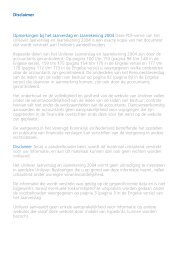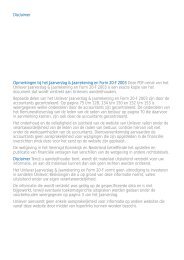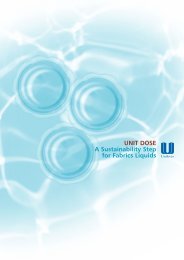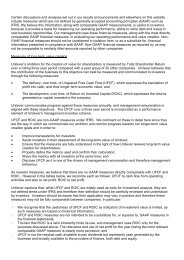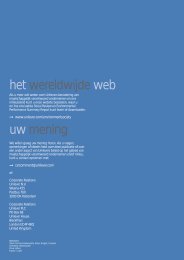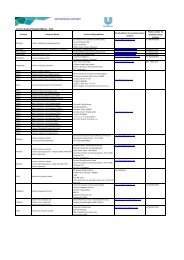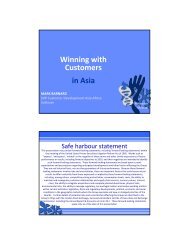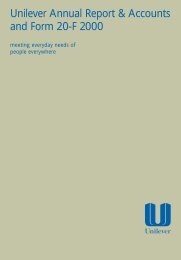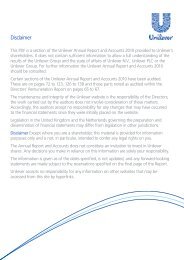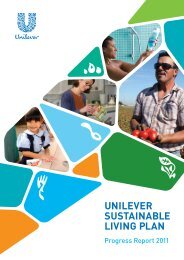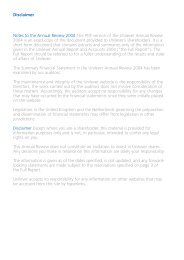Meeting everyday needs of people everywhere - Unilever
Meeting everyday needs of people everywhere - Unilever
Meeting everyday needs of people everywhere - Unilever
Create successful ePaper yourself
Turn your PDF publications into a flip-book with our unique Google optimized e-Paper software.
62 <strong>Unilever</strong> Annual Report on Form 20-F 1999 Financial Statements<br />
Accounting information and policies<br />
<strong>Unilever</strong> Group<br />
<strong>Unilever</strong><br />
The two parent companies, NV and PLC, operate as nearly<br />
as is practicable as a single entity (the <strong>Unilever</strong> Group, also<br />
referred to as <strong>Unilever</strong> or the Group). NV and PLC have<br />
the same directors and are linked by a series <strong>of</strong><br />
agreements, including an Equalisation Agreement, which<br />
is designed so that the position <strong>of</strong> the shareholders <strong>of</strong><br />
both companies is as nearly as possible the same as if they<br />
held shares in a single company.<br />
The Equalisation Agreement provides for both companies<br />
to adopt the same accounting principles and requires as<br />
a general rule the dividends and other rights and benefits<br />
(including rights on liquidation) attaching to each Fl. 12<br />
nominal <strong>of</strong> ordinary capital <strong>of</strong> NV to be equal in value at<br />
the relevant rate <strong>of</strong> exchange to the dividends and other<br />
rights and benefits attaching to each £1 nominal <strong>of</strong><br />
ordinary share capital <strong>of</strong> PLC, as if each such unit <strong>of</strong><br />
capital formed part <strong>of</strong> the ordinary capital <strong>of</strong> one and<br />
the same company.<br />
Basis <strong>of</strong> consolidation<br />
By reason <strong>of</strong> the operational and contractual arrangements<br />
re f e r red to above and the internal participating interests set<br />
out in note 20 on page 80, NV and PLC and their group<br />
companies constitute a single group under Netherlands<br />
and United Kingdom legislation for the purposes <strong>of</strong><br />
presenting consolidated accounts. Accordingly, the<br />
accounts <strong>of</strong> the <strong>Unilever</strong> Group are presented by both NV<br />
and PLC as their respective consolidated accounts. These<br />
accounts are supplemented in notes 21 and 22 on page<br />
84 and note 34 on page 103 by additional information for<br />
the NV and PLC parts <strong>of</strong> the Group in which group<br />
companies are consolidated according to respective<br />
ownership.<br />
Companies legislation<br />
The consolidated accounts <strong>of</strong> the <strong>Unilever</strong> Group comply<br />
with Book 2 <strong>of</strong> the Civil Code in the Netherlands and the<br />
United Kingdom Companies Act 1985. The Company<br />
accounts, the notes to those accounts and the further<br />
statutory information given for each <strong>of</strong> NV and PLC<br />
comply with legislation in the Netherlands and the<br />
United Kingdom respectively. As explained under ‘Group<br />
companies’ on page 63, in order to give a true and fair<br />
view, the presentation <strong>of</strong> the consolidated capital and<br />
reserves differs from that specified by the United Kingdom<br />
Companies Act 1985.<br />
OECD Guidelines<br />
In preparing its annual accounts <strong>Unilever</strong> adheres to the<br />
disclosure recommendations <strong>of</strong> the OECD Guidelines for<br />
Multinational Enterprises.<br />
Accounting standards<br />
The accounts are prepared under the historical cost<br />
convention and comply in all material respects with<br />
applicable accounting principles in the Netherlands and<br />
with United Kingdom Accounting Standards.<br />
The accounting policies <strong>of</strong> the <strong>Unilever</strong> Group are set out<br />
on pages 63 to 65. Material variations from United States<br />
generally accepted accounting principles are set out on<br />
pages 106 and 107.<br />
United Kingdom Statement <strong>of</strong> Standard Accounting<br />
Practice Number 15 (SSAP 15) requires that no provision<br />
should be made for deferred taxation where it is probable,<br />
based on reasonable assumptions, that a liability will not<br />
crystallise. In this respect, SSAP 15 is not in agreement<br />
with Dutch law as currently applied. For this reason,<br />
and because <strong>of</strong> the Equalisation Agreement, full provision<br />
continues to be made for deferred taxation. The effects<br />
<strong>of</strong> this departure from SSAP 15 are shown in note 6 on<br />
page 73, note 18 on page 78 and note 30 on pages 90<br />
and 91.<br />
United Kingdom Urgent Issues Task Force Abstract 13<br />
(UITF 13) requires that NV or PLC shares held by employee<br />
trusts to satisfy options should be classified by the<br />
sponsoring company as fixed assets. Dutch law requires<br />
such shares to be accounted for within capital and<br />
reserves. In order to comply with Dutch law and the<br />
Equalisation Agreement, the requirements <strong>of</strong> UITF 13<br />
have not been followed. All shares held internally are<br />
accounted for in accordance with Dutch GAAP. The effects<br />
<strong>of</strong> this departure are shown in note 22 on page 84.<br />
United Kingdom Financial Reporting Standard 12<br />
‘Provisions, Contingent Liabilities and Contingent Assets’<br />
became mandatory for all UK companies with accounting<br />
periods ending on or after 23 March 1999. The only<br />
material impact <strong>of</strong> the adoption <strong>of</strong> this standard was the<br />
reallocation <strong>of</strong> fixed asset write down provisions to<br />
depreciation as disclosed in note 9 on page 75.<br />
The Group has also adopted United Kingdom Financial<br />
Reporting Standard 13 ‘Derivatives and Other Financial<br />
Instruments: Disclosures’ and this has resulted in<br />
additional disclosure in notes 14 and 15 on pages 76<br />
and 77.<br />
United Kingdom Financial Reporting Standard 15<br />
‘Measurement <strong>of</strong> Tangible Fixed Assets’ was issued in<br />
1999. The adoption <strong>of</strong> this standard did not result in a<br />
material change.



